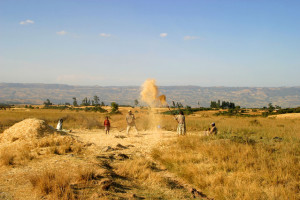In most African countries, 80% of the total population engages in agriculture, mostly small scale farming. As a result of this, African farmers end up having very little land each. This is in contrast to UK where large tracts of land are used by farmers to plough their crops. UK farming technologies are more advanced as compared to the tools used by African farmers. There are dramatic differences between Africa and UK; from crops to climate but there are similarities that both farmers can experience. This paper seeks to highlight some of the farming similarities between the UK and Africa.
- Keeping soils healthy
Preserving healthy soils is vital to the world over. Understanding how to develop, and sustain soil health is the main focal point of farming in some countries in Africa for example, Kenya. Soil testing and be aware about soil health is very vital. Affordable, portable soil testing kits would help in transforming yields. Similarly, in the UK organic farming is most preferred because it is less dependent on oil-based fertilizers and pesticides and bestows resilience in the face of extreme climatic conditions. Organic farming also stores higher levels of carbon in the soil.
- Water Conservation
In Africa, drought does not only hit crop yields but also has an impact on life itself, unlike in the UK. However both farmers are struggling to come up with ways to manage water usage more wisely. Some of the mechanisms both African and UK farmers have implemented are: capturing rain water by digging ridges and pits, encouraging the use of disease resistant crop seeds, small-scale irrigation, and planting of drought tolerant crops.
- Optimizing yields and quality
Both Africa and the UK face the most basic concern of increasing production and improving quality. This means that food production needs to rise by 70% over the next couple of years to meet the demand of rise in population and climate changes. The main idea is sustainable agriculture; farmers being able to duplicate produce over and over for a specific market and environmental management.
- The growing importance of women in farming
For many generations now, women in the UK have played a vital supporting role in farming businesses, but only until lately have they become main influencers and business innovators in their own right. Traditionally, African women are restricted by culture from becoming economically independent. However indulgence in farming projects e.g. bee keeping and other small projects is helping to change that.
As input costs on UK farms continue to escalate, focusing attention to getting the best deal; the concerns in Africa are mostly about getting access to the correct inputs in the first place and utilizing them correctly. Both farmers in the UK and in Africa agree that they need high quality inputs e.g. good quality fertilizer in order to increase farm yields.
- Waste Management
In the UK attention on waste is normally on it once it leaves the farm, whereas in Africa the attention is at other stages in the chain. The difference is that in the UK there is little to no waste in the production process (but people waste food after buying it) whereas in Africa 40% of the produce goes to waste before it gets to the market (but used once people have bought it). The similarity here is that both farmers have their own distinct way of managing wastage.

